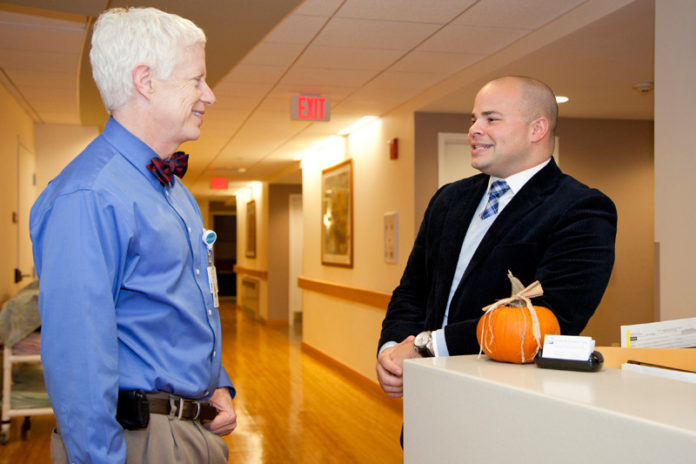
When Ocean State Job Lot co-owner Alan Perlman recently found himself with a pricing deal on Kellogg’s cereal too good to pass up that involved more stock than he could sell, he found an easy solution.
Perlman bought the 9,000 cases required and donated the extra 1,500 he couldn’t keep to six food banks in the New England region, including the Rhode Island Food Bank.
“I was able to stretch the dollars and give away three times the amount of an item as normal,” Perlman said. “Kellogg shipped it directly to the food banks, so they know it went there and now know when they have something, they can call me. It allows me to give more to [our] communities.”
That example of corporate philanthropy is the kind of micro-level giving that local business leaders and nonprofit organizations say should be in the news more often and could do wonders to dispel the negative headlines surrounding the spirit of philanthropy in Rhode Island.
Earlier this year, for example, The Chronicle of Philanthropy ranked the Ocean State among the worst for charitable giving, reporting that a typical Rhode Island household gave 3.1 percent of a discretionary income to charity, for a total of $350.9 million in reported charitable giving, putting the Ocean State in 46th place nationwide.
By comparison, top-ranking Utah gives 10.6 percent of discretionary income per household for a total of $2.4 billion.
Nearby Massachusetts fared even worse than Rhode Island, ranking 47th with a 2.8 percent giving rate but with a reported total of $3.1 billion.
But those who deal daily with philanthropy policies and strategies say relying solely on dollar amounts only gives a glimpse into overall giving and that looking at macro-level statistics can be misleading.
Fidelity Charitable, an independent public charity, reported in The Fidelity Charitable Giving Season 2012 study that on average, Americans expect to give $2,400 to charity this year, increasing their donations from $2,100 last year.
“While there is still uncertainty about where the economy is headed, Americans are showing a willingness to give more to the causes they care about,” said Sarah Libbey, president of Fidelity Charitable, in a statement. “This is particularly important as past and proposed cuts in federal and state funding have charities seeking more support from private donors.”
There’s little doubt that Rhode Island nonprofits have felt those cuts and several have recently reported reworking their strategies to secure private funding.
Charles Iacono, vice president of philanthropy for the Home & Hospice Care of Rhode Island, said the nonprofit that provides end-of-life and palliative care to the terminally ill, among other services, has not seen any loss of local corporate support. In fact, he said, they’ve seen increased support from corporations, including Citizens Bank, Amgen, and Bank of America.
“Foundations and corporations look to programs that resonate with their mission. I think the corporate community in Rhode Island has been extremely generous over the years,” Iacono said. “I [do] think the days of just giving money away are over. We’ve always remained very specific and targeted in our approach.”
The Fidelity survey also indicated that individual donors are more likely to give to causes for which they feel a personal connection, reporting that 71 percent are influenced to give by a life event, including death or illness among family or friends. Forty-four percent of respondents to that survey said they give to set a good example for their family or community.
Centreville Bank, which operates seven branches in Rhode Island, donated the same amount, $50,000, this year to the University of Rhode Island Foundation as it did in 2007 to support undergraduate scholarships.
By setting up a charitable foundation several years ago, Bolster said, the bank has been able to almost double its charitable giving. Kent Hospital is another recipient.
“We’ve been around as a community institution since 1828 and we’ve always been generous to the communities we serve in both good times and bad economically,” Bolster said. “We see ourselves with a responsibility to be philanthropic. We help advance missions.”
Corporations such as Citizens Bank also report increased giving, through time and money, among their employees.
Last year Citizens employees donated their time during lunch hours and nonwork hours to nonprofits across Rhode Island, from serving on organization boards to painting rooms and cleaning up playgrounds.
The corporation’s Gear for Grades program started in 2003 in Rhode Island, and has expanded as an increase in requests for backpacks and school supplies has followed the economic downturn and slow recovery.
Customers and colleagues donated supplies to fill some 14,000 backpacks this year. Citizens Bank, said Kathy O’Donnell, director of public affairs, also makes large grant donations to organizations such as Crossroads Rhode Island and the Rhode Island Community Food Bank.
“When we’re giving grants and making sponsorships in the community, we really look for impact and ways we can convene other partners to benefit the nonprofit community at large. Our approach is pretty holistic,” O’Donnell said. “We want to make sure we’re looking at our giving dollars in a very strategic way in that they are addressing a very specific issue. I think we’ve been able to impact in a small way major issues that are happening as a result of the economic condition.”
The Fidelity survey reported that 42 percent of respondents cited improved personal economics for giving more this year, including a new job, raise or lowered household expenses.
Anthony Maione, president and CEO of United Way of Rhode Island, said he has seen campaign giving, from individual and corporate donors, including Citizens Bank.
“Is Rhode Island challenged? Yes. The whole country is challenged,” Maione said. “Organizations that are successful right now are getting donors involved in their work. All of the studies show a person who is volunteering, giving their time and thoughtfulness, is probably going to give you more money at the end of the day because they feel engaged in the work you’re doing.”
Maione points to United Way of Rhode Island’s Women’s Leadership Council, whose members were charged with choosing their own philanthropic duties. They picked a reading project that put 13,000 books in the hands of low-income household children in the state and raised $370,000.
“They were really leaning into the issue,” Maione said. “When you give people a chance to give you their advice, they’re with you.”
Perlman said last year’s Christmas food drive, through which Ocean State customers made in-store financial donations – which the company has done for 10 years – brought in more than $1.2 million. Ocean State then contributed $100,000 and the costs of packing and shipping food purchased with the donations.
The company also recently sent inventory clothing to Staten Island for Hurricane Sandy victims.
“We’ve always given back. … Our concept of giving isn’t based on success. We’d like to think we’re very creative in how we give back,” Perlman said. “We could give money, which we do. We could give goods, which we do. I can use my contacts. I give away what I can give.” •











